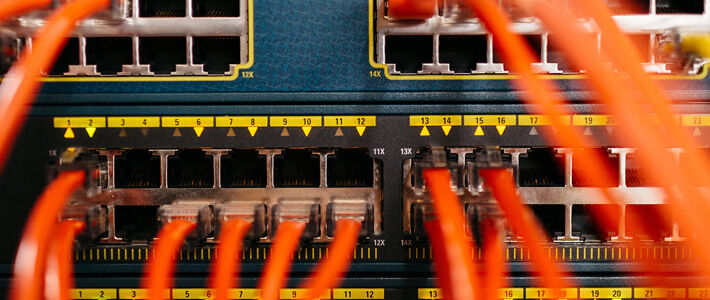
Cisco Certified Network Associate (CCNA) Blended delivery
Currently viewing course to start in 2025/26 Entry.
This course provides self-paced blended learning with a requirement to attend in-person classes on alternate Saturdays over the duration of the course. The course follows the Cisco Networking Academy Curricula for CCNA v7 in preparation for taking the current CCNA certification exam.
- Level CPD
- Study mode Short Course
- Award N/A
- Start date October 2025
- Subject
- Location City Centre
This course is:
Overview
This course provides self-paced blended learning with a requirement to attend in-person classes on alternate Saturdays over the duration of the course.
The course follows the Cisco Networking Academy Curricula for CCNA v7 in preparation for taking the current CCNA certification exam.

Introducing STEAMhouse
STEAMhouse is a centre for technology, innovation, creative thinking, prototyping and business development. Our £70 million pound building is the home for all of our Computing courses.
What's covered in this course?
You will have access to the official Cisco Networking Academy online curricula and Packet Tracer network simulation software, and work through the e-learning material, completing the relevant practical and theoretical exercises provided. The course provides 24/7 access to the online material, which includes pre-recorded video tutorials and remote access to real networking equipment.
The course consists of three modules, each of which culminates in an online exam and practical test held at the University, for which you will receive a course completion certificate.
Why Choose Us?
- The University is an accredited vendor certification centre, allowing students to sit the vendor certification exam required to become a full Cisco Certified Network Associate.
- Practice certification exams are available via the Cisco Networking Academy, to allow you to practice remotely for the vendor certification exam.
Fees & How to Apply
Course in Depth
The course covers the CCNA exam objectives using the Cisco Networking Academy Online curricula. The course is split into three modules which include theory and practical tests after each stage:
1) CCNAv7: Introduction to Networks (ITN): introduces the architectures, models, protocols, and networking elements that connect users, devices, applications and data through the Internet and across modern computer networks - including IP addressing and Ethernet fundamentals. By the end of the course, students can build simple local area networks (LAN) that integrate IP addressing schemes, foundational network security, and perform basic configurations for routers and switches.
2) CCNAv7: Switching, Routing, and Wireless Essentials (SRWE): focuses on switching technologies and router operations that support small-to-medium business networks and includes wireless local area networks (WLAN) and security concepts. Students learn key switching and routing concepts and can perform basic network configuration, troubleshooting and mitigation of LAN security threats.
3) CCNAv7: Enterprise Networking, Security, and Automation (ENSA): describes the architectures and considerations related to designing, securing, operating, and troubleshooting enterprise networks. This course covers wide area network (WAN) technologies and quality of service (QoS) mechanisms used for secure remote access along with the introduction of software-defined networking, virtualization, and automation concepts that support the digitalization of networks. Students gain skills to configure and troubleshoot enterprise networks, and learn to identify and protect against cybersecurity threats.
Facilities & Staff
Our Facilities
We are constantly investing in our estate and are currently in the process of spending £260 million on new learning facilities. This course will be taught at Millennium Point at the City Centre Campus.
The course is supported with a wide range of cutting-edge facilities in the City Centre Campus. We have a state-of-the-art computer games technology lab which contains high-performance PCs, Sony PlayStation development kits and a range of industry standard software including Unity, Unreal and a suite of professional Microsoft development tools.
We also have many open access areas where students can study together and even hire out laptops for use in these spaces and others within the university.
Within the University there are many internationally recognised research teams giving you the opportunity to collaborate with them on exciting interdisciplinary projects.
Computer networking
The laboratories are well-equipped for all our computer networking courses, as well as specialist areas for practical work such as voice-over internet protocol (VoIP), forensic and ethical hacking technologies, wireless and mobile technologies and radio frequency identification technologies to name but a few.
Software development and computer programming
There are a number of open access, software development and computer programming laboratories that can be used to develop systems and programmes, including database management systems such as MySQL, to name but a few.
Systems laboratories
Our embedded systems laboratories are used to develop real-time systems, such as specialist hardware training and development resources, and industrial-standard software development and simulation tools. These include microcontroller software and robotics design and development, to name but a few.
Electronic systems
To underpin the basic principles of electronic systems, we have a well-equipped laboratory of general and specialist test and measurement kits, including powered prototyping development boards, dual power supplies, frequency generators and counters and digital multi-meters to name but a few.
Forensic computing
Our successful development of forensic computing has led to a specialist forensics laboratory that is fully equipped with essential hardware and software for this sensitive area of study. The laboratory includes high-spec PCs with built-in multi interface Tableau write blockers, EnCase and FTK computer forensic software and steganography detection and analysis software, to name but a few.
Enquiries
Course enquiries
For more information on this course, and to apply, contact Phill Harris on:
Email: phillip.harris@bcu.ac.uk
Tel: +44 (0)121 331 7531